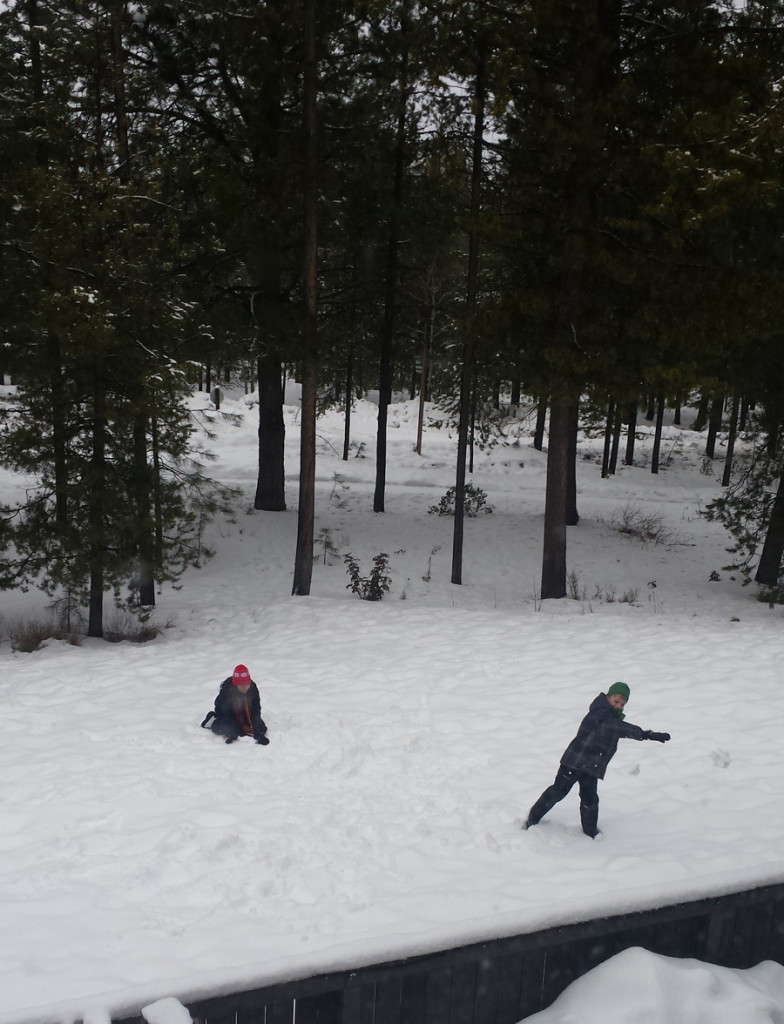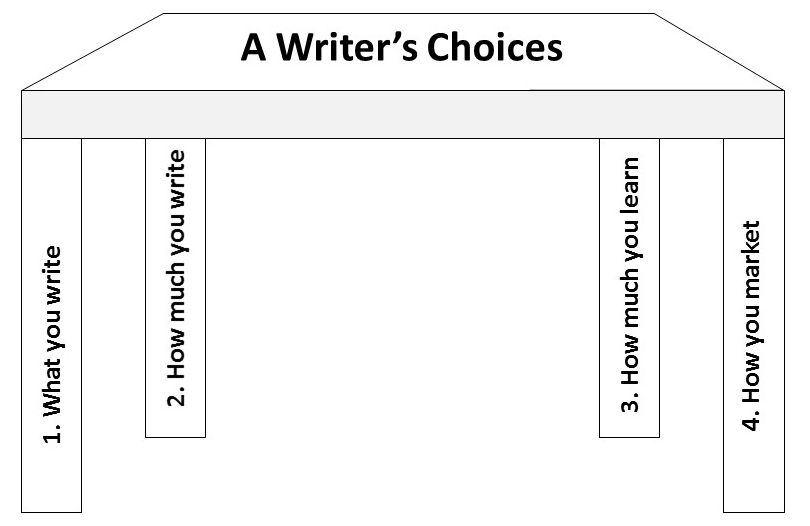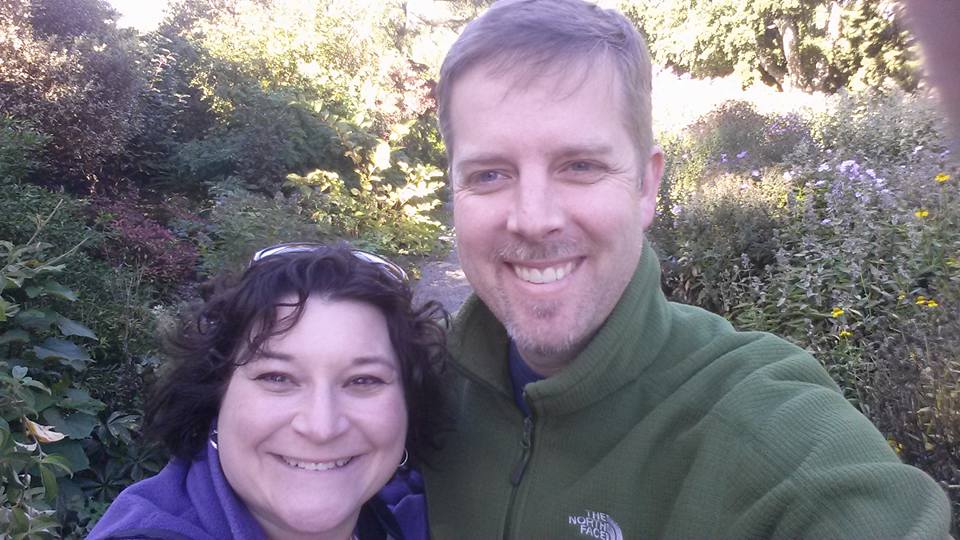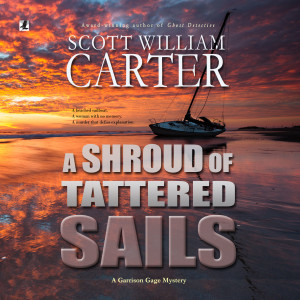Reason #1:

Reason #2:

The two pictures above were taken about a week apart, both in the heart of winter here in Oregon. The first was at Cape Lookout, a two and a half mile hike that juts almost straight out into the Pacific Ocean. We took the whole family in early January and it was warm enough, even with the breeze, that most of us were shedding our jackets before too long. At the end, not far from where this shot was taken, we spotted quite a few whales making their migratory journey. The second shot are the kids playing in the snow a few days later in Sunriver, a resort on the Eastern side of the Cascade Mountains.
Sun on the coast one weekend, snow in the mountains the next, both within a few hours of the house. That said, you’ve got to be able to stand often weeks and weeks of near endless gray and drizzle, and we’ve certainly had that in spades. But if you want a different climate or topography, you often don’t have to go far in Oregon to find it.
The fourth Garrison Gage book, A Shroud of Tattered Sails, has been selling very well. It seems with each Gage book I release, the audience grows a bit more, and for that I’m quite thankful. Right now, I’m working on the third Myron Vale book and it’s coming along nicely. After that, well, I don’t like to think that far ahead if I don’t have to, and I have the luxury of being a writer who doesn’t have to. If I start to think I’ve got my writing projects all planned out, that takes a lot of the fun out of it. But rest assured, there will be another Gage book before too long. I’ve been working on being a bit more prolific going forward, something I’ll discuss more in a moment.
Astute readers may have noticed a slight change in the website. A series of vicious hacks forced the issue (all automated hacks exploiting weaknesses in the WordPress platform), but I took the opportunity to revamp the look, modernizing it and cleaning it up a bit. It got me thinking about promotion, about how little I really do, at least as most writers would define it. I don’t really blog, usually only updating my website when I have news. I don’t podcast. I don’t spend much time on social media. I don’t do many book signings, conferences, or workshops. Because of my day job at the university and my busy life with a wife and two kids, I’m very much a self-promotion minimalist. In fact, the past two years, as I was getting a Master’s degree, I spent very little time on the marketing side at all.
And yet I had the best two years of my life as a writer.
This isn’t to say that I think marketing is a waste of time. Oh no, far from it. I really believe in loss leaders, for example, especially when it comes to writing in a series, and especially in a digital marketplace where the cost of production, at least for the writer, is nearly zero. (Writers still applying twentieth century brick and mortar thinking to a twenty-first century digital marketplace are seriously handicapping themselves.) There are lots of other things worth doing, and even more things that aren’t. But I do think that any professional writer — really, any professional artist, musician, or entertainer in general — should be clear about their choices, about where they spend their time, and about the actual impact those choices have on their long-term success.
That brings me to a little metaphor I created, one I designed to help me get better focused about what I’m trying to accomplish. It was so helpful to me that I also plan to use it the next time I teach a writing class. I call it the Professional Writer’s Table, but it could just as easily be a professional artist’s table or a professional musician’s table. Just change the word “write” to “create.” It looks like this:

The main question I’ve been asking myself is this: What do I have control over? Or at least, what do I have the most control over? Where do I have choices, and how do those choices affect my success? Basically, the idea is that there are four main areas that a writer has the most control over that directly affect his or her success, each of these being a leg of the table:
- What you write
- How much you write
- How much you learn
- How you market
Rather than abstract terms like “content” and “productivity,” I prefer concrete words that are more actionable — which, of course, is a fairly abstract word, but we’ll let that pass for now. There are so many ways for a writer working today to spend his or her time that it’s easy to get overwhelmed. These four legs are what I think constitutes a very sturdy table. If you are negligent in any of the legs, well, it can make your table pretty shaky after a while. A lot of writing with a poor marketing strategy often results in lackluster sales. A lot of learning without actually producing much — like the workshop junkie who goes to lots of classes but doesn’t actually write unless compelled to do so by a teacher — is equally out of whack.
Let’s take them each in turn.
1. What you write. Do you write mysteries or romance books? Do you write short stories or novels? These are decisions about content and format. How much control you apply here will depend on your view of the creative process, and your particular make-up as a creative professional. Some people prefer to just let a story go where it wants to go, starting with a title or an intriguing idea and imposing little control over the process in the beginning. Others do market research and try to pinpoint what they feel is an under-served market (say, romances featuring werewolves). I don’t think either approach is wrong, but I would say if you’re not having the kind of success you want (notice how I phrased that), it’s a good place to start questioning your assumptions.
2. How much you write. Pages written, words typed, books finished. At the university, I work around people who think producing one book a year is lightning fast. Most of my professional writer friends think that’s painfully slow. It’s the simplest leg of the table to fix, and the hardest to actually do. Just write more. And yet, it’s usually the leg of the table that’s the weakest for most people. But focus on this area, and options open up in the other three. You have more choices about what you write. You have more opportunities to practice and learn, and of course more possibilities when it comes to marketing your work.
3. How much you learn. If you want to have more success, you have to keep learning, not just about the craft of writing, but the business side of things as well. This might mean taking a class, attending a workshop, reading a how-to book, or keeping up with publishing news. It might mean simply spending a lot of time studying master storytellers (hopefully people succeeding now, not twenty or fifty years ago). This changes from person to person, and even for a single person during different points in their life. For example, I used to take a lot of classes and workshops, but I eventually hit a point where I felt that approach was hurting more than it was helping, and I now I spend more time studying on my own. That may change in the future. Every writer is different, but it never hurts to keep asking yourself a simple question: “How can I get better?” From my point of view, it’s one of the great joys of the creative professional. If I didn’t think I could get better, I’d probably stop. And if you’ve hit a plateau with your creative life, focusing heavily on learning is a good place to start.
4. How you market. I use this word in the broadest sense, as in both “bringing your work to market” and marketing as promotional strategies and tactics. I thought about calling it “how you sell” instead, and some people may still prefer that. But whatever you call it, this is such a critical area that it fully deserves its own leg of the table, and it’s the one that also offers the most traps and pitfalls. There are no right answers. There is only what works, and what works for you. Those “experts” who offer lots of restrictive do’s and don’ts are usually saying more about their own biases and blind spots than about what will really work for you. Every creative person needs to figure this out for themselves, and that usually means casting a wide net and a lot of trial and error. But it’s also a good idea to ask yourself what’s working for people now (not ten years ago), and seeing if what they’re doing will work for you.
There’s a lot more that could be written about these four legs of the table, and I know a lot of people will quibble that I’m missing some key areas. What about the business side of things, for example? Doesn’t that deserve its own leg? Well, in my mind, that’s covered under “how you market,” but the truth is that I wanted to keep this metaphor very simple so it helped me focus on what I could do that would have the highest impact on my success. There are so many temptations for my time, so many rainbows I can chase that probably won’t have much effect on helping me achieve my potential as a writer — which is my singular goal right now. Start a magazine? Blog about the changes in publishing? Edit an anthology? Start a business that offers publishing services? Do more paid teaching and presenting?
These are all things I’ve considered, and each of them has that bright and shiny allure that makes them especially tempting, but this tool made it abundantly clear to me that writing more is the best thing I can do for my writing career, which will in turn give me more options in the other three areas. Perhaps this is no surprise, since I’m the one who coined the WIBBOW test (which stands for Would I Be Better Off Writing?), but it still reaffirms what I really believe has the biggest impact on my long-term success.
This metaphor isn’t meant to be all-encompassing, and I’m sure others will have their own take. It certainly started a lively discussion at a monthly professional writer’s group I often attend (If you find it useful, feel free to use, share or modify.) There’s no health leg, or family leg, or fun leg, but that wasn’t the point. The point was to help me stay focused on what will get me where I want to go as a writer, even when that means most of my effort is, as usual, done far from the bright lights and the big crowds. That’s often the way it is. It doesn’t mean those other things I mentioned above aren’t worth doing, or that I won’t do them at some point in the future; it just means I’m making the hard choices to spend my time on what matters the most to me, right now, to get me where I want to go, even if those choices don’t always seem to offer the most enticing short-term rewards.
I’ll finish this post with another picture from our Cape Lookout hike a few months back. Why? Well, just because, that’s why.

























